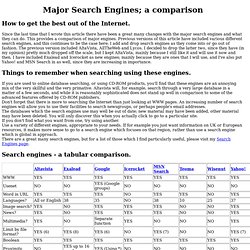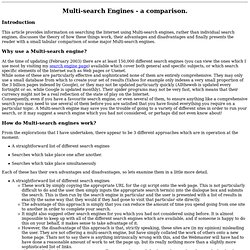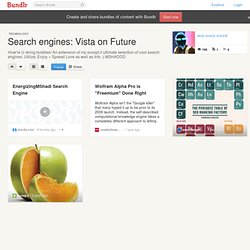

Releton Search. Songboxx >♫> Beaucoup! Meta & Parallel. Comparison 2. How to get the best out of the Internet.

Since the last time that I wrote this article there have been a great many changes with the major search engines and what they can do. This provides a comparison of major engines. Previous versions of this article have included various different search engines, and this continues to be the case here; I add and drop search engines as they come into or go out of fashion. The previous version included AltaVista, AllTheWeb and Lycos. I decided to drop the latter two, since they have (in my opinion) pretty much dropped off the scale, but I kept AltaVista, mainly because I still like it and will use it now and then. Things to remember when searching using these engines. If you are used to online database searching, or using CD-ROM products, you'll find that these engines are an annoying mix of the very skillful and the very primative.
Search engines - a tabular comparison. Search Engine features WWW Does the search engine search the web? The league table. Comparison 1. Introduction This article provides information on searching the Internet using Multi-search engines, rather than individual search engines, discusses the theory of how these things work, their advantages and disadvantages and finally presents the reader with a small tabular comparison of some major Multi-search engines.

Why use a Multi-search engine? At the time of updating (February 2003) there are at least 150,000 different search engines (you can view the ones which I use most by visiting my search engine page) available which cover both general and specific subjects, or which search specific elements of the Internet such as Web pages or Usenet.While some of these are particularly effective and sophisticated none of them are entirely comprehensive.
How do Multi-search engines work? From the explorations that I have undertaken, there appear to be 3 different approaches which are in operation at the moment: Harvester Search Porta. Harvester2. Harvester. Harvester3. Gnosh. UnaBot. VROOSH! AllPlus. Zuula Search. PolyMeta. Qksearch. TurboScout. Internet marketing guide. Kosmix. Directory. My Excite. Family Friendly Search. Ixquick.
WebCrawler. Vivisimo. T10. Search.com. MetaCrawler. Yippy. Mamma.com. Infospace.com. Dogpile. iZito. Entireweb. What is metasearch engine? Pros and Cons. iBoogie. Vista on Future. Wolfram Alpha isn't the "Google killer" that many hyped it up to be prior to its 2009 launch.

Instead, the self-described computational knowledge engine takes a completely different approach to letting users find and analyze information. Rather than scouring the Web and ranking everybody's pages in the order it thinks we'd find them useful, it uses its own data sets and computational power to return detailed reports and analysis about whatever topics users query it for. Tomorrow, the service will ramp things up a notch when its "pro" version launches. For $5 per month, Wolfram Alpha Pro will allow users to do way more with its data, as well as enable them to upload their own.
The premium offering will be discounted for students and enterprise users. This is freemium done right. The value offered by Wolfram Alpha Pro is two-fold, and it sits at both ends of the query process. Ithaki. InfoGrid(tm) Info.com. Practical Tools for Dynamic Search Suggestions. ToxSeek. Not Exactly Meta, BUT VERY HELPFUL. Nexplore. MelZoo. ▲WebClust▲